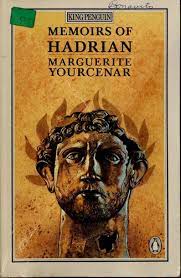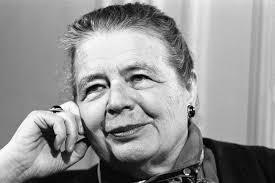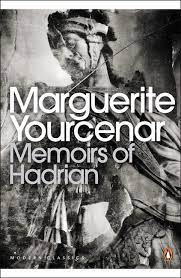Marguerite Yourcenar, Memoirs of Hadrian (1951).
Good Reads meta-data is 288 pages, rated 4.24 by 23,264.
Genre: fiction, autobiography .
Verdict: Zen.

The ageing Emperor Hadrian writes a long, reflective, meditative letter to his designated successor, Marcus Aurelius. In so doing he rewinds the spool of his life from beginning to his fast-approaching end. Through Hadrian, Yourcenar conjures worlds, plumbs the mysteries of life and love, and offers some hard-earned advice to Marc and over his shoulder to readers.
It seems effortless to read, smooth as glass and offering a depth of vision with a calm detachment. It is no surprise then to learn in an afterword that she worked on this manuscript for more than twenty years to achieve this diamond finish. The poet W. B. Yeats said revision made him a better person, or something like that. Marguerite Yourcenar must have been a truly excellent person to have spun this prose.
Hadrian’s travels make up much of the book. One long episode concerns his efforts to negotiate a peace with some Zealots in Israel. No matter how much he was willing to concede it was never enough for his interlocutor, Akiba, who preferred isolation, and finally eradication to – in Hadrian’s eyes – the slightest compromise. Hadrian describes him as dried, rigid, ignorant, wilful, narrow, bigoted, but listened to his harangues for eight days in an Olympic instance of patience. Seeing that Hadrian had not begged forgiveness for having been born and had not admitted his inferiority to him, Akiba gave up trying to save his soul and left. Worse came to worst. (Self-indulgent note: I came across more than one Little Akiba in university life, intransigent individuals who could not see a matter from any point of view but their own. Any other perspective was at best wrong, and more likely to be evil. A Manichaean world view often seems attached to the PhD.)
That approach to negotiation as an opportunity to harangue others into admitting your superiority still seems to characterise much of domestic and regional politics in the Middle East. The race is to the high ground, not to the common ground.
There are lower key episodes on Hadrian’s difficulty in sleeping, his political marriage, the competition for his favour, his hopes for Marc, and more.
Some of the wise words:

Battles are not won with hate. Anger can make a man brave, but it also makes him stupid, tripping over his own feet.
Good like bad becomes a habit and the temporary tends to endure, and that what is eternal permeates to the inside; over time the mask becomes the face.
Watching the season come and is constant travelling of the earth.
A book may lie dormant for years, even eons, yet upon being opened its marvels, abysses, and more are revealed to the reader alone.
Friendship is a kind of choreography.
An ineffable current passes through a poet in creating a poem.
Libraries are a reserve against spiritual winters which recur.
One of the many things to like about this book is that Hadrian, speaking of the past, uses the past tense. Oh, if even historians these days would do that instead of flattening the topography of time into the eternal present tense.

